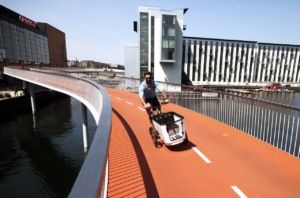News
Flogging the dead horses that are hygge and best city awards
This article is more than 9 years old.
Copenhagen’s the most liveable city in the world, according to Metropolis magazine

Cykelslangen: a reminder that top city lists are a lot like games of snakes and ladders (photo: Jakob Munk)
It’s well documented how British broadsheet newspapers like the Guardian and Telegraph are massive Danophiles, but the same can’t be said of media digest magazine The Week UK.
If you based your knowledge of the continent on its ‘Europe at a glance’ section on page 5, you’d be forgiven for thinking Denmark didn’t exist. Rarely does anything happen here that’s thought worthy of its attention.
READ MORE: Hygge is ‘the link’ to Danish happiness, claims new book out today
Done to death
But in the current issue (see above), not only is there a whole ‘Talking points’ section dedicated to Denmark, but also a snippet mention on the frontpage.
“Fantastic!” we hear you murmur. Finally, some recognition that windfarms might be an eyesore worth tolerating. Or something about generous welfare.
No, the subject in question is, for the umpteenth time, “the Danish recipe for happiness” and hygge. Aaargh! Will this topic ever be done to death enough?
Hygge reading
Well, apparently not, as over the last week every British broadsheet has jumped aboard the jolly hygge express to celebrate the launch of a multitude of books on the topic.
Their comment sections have accordingly been swamped by readers of British newspapers complaining about the number of hygge stories – in such volumes that the editorial boards have already commissioned their next story on the subject.
Most liveable city
In other news involving the flogging of dead horses, the architecture and design magazine Metropolis has named Copenhagen as the most liveable city in the world.
READ MORE: Inside this month: The month when Denmark’s trivial lifestyle divider comes into play
The magazine conducted in-depth research and comparative analysis in four key areas: housing, transportation, sustainability and culture.
READ MORE: Copenhagen receives international acclaim for creating good urban spaces
Its report heavily lauded Copenhagen’s cycling culture and the health benefits of its overall participation rate, commending the addition of recent shortcuts (not always conducive to fitness levels) to the infrastructure, including Cykelslangen and Inderhavnsbroen.
READ MORE: Tourists and citizens flocking across new city bridge











































